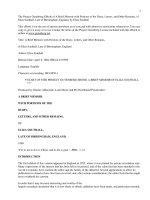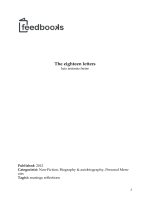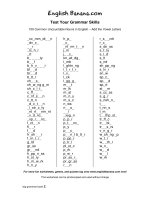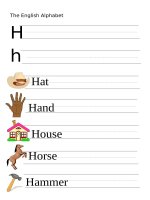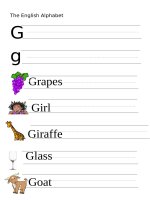The Follow-Up Letter
Bạn đang xem bản rút gọn của tài liệu. Xem và tải ngay bản đầy đủ của tài liệu tại đây (130.3 KB, 21 trang )
Chapter 6
The Follow-Up Letter
Before reading any further, it’s imperative to understand the distinction between
the Follow-Up Letter, which is covered in this chapter, and the Thank-You Letter,
which is covered in the following chapter. In a Thank-You Letter, your sole purpose
for writing is to express appreciation. In the Follow-Up Letter, your “thank-you”
is only an excuse for writing to those who have the power either to hire you or to
influence the hiring decision in your favor.
In this chapter, we focus on the Follow-Up Letter, the letter you write after
being interviewed for a position that you are interested in attaining. Although you
may begin your Follow-Up Letter by thanking your reader for a meeting, advice,
a referral, or for consideration, your primary goal is to continue promoting yourself
and your candidacy. You accomplish this by achieving your secondary goal, which
is to strengthen a connection with your reader that you established during an in-
terview, meeting, or other prior contact.
When should you send a Follow-Up Letter after interviewing for a position
in which you are interested? Always. When should you send the same person an-
other Follow-Up Letter after interviewing a second time for a position in which
you are interested? Always. When should you send a Follow-Up Letter after re-
ceiving help from someone who can influence the hiring decision? Always.
You ’ll find Follow-Up Letters easy to draft if you follow these steps.
STEP 1: RE-ESTABLISH THE CONNECTION
Open your letter by mentioning something that will identify yourself to your
reader, such as the time or place of the meeting. Because it’s likely that your
prospective employer met with numerous candidates, it’s vital that she remem-
bers you. If your meeting occurred early on in the hiring process, it’s even more
critical that your interviewer remembers you. And it’s vital that her memory of
you is a positive one.
Therefore, in your opening refer to a common link that was revealed during
your meeting. You may have discovered, for example, that you and your inter-
viewer both worked at the same company in the past, or that you share an alma
mater, professional association, or business philosophy. Such a connection subtly
suggests that you and your prospective employer are similar in some way, and
will find common ground on which to build a rapport. (Unless you’re planning to
187
F
O
L
L
O
W
-
U
P
L
E
T
T
E
R
S
07 6/27/03 9:21 AM Page 187
Copyright 2003 by The McGraw-Hill Companies, Inc. Click Here for Terms of Use.
work for Scrooge himself, it’s a sure bet that your next boss will be searching for
someone with whom he can get along on a daily basis.)
If there is no apparent connection of this type, refer to an unusual topic you
discussed with your interviewer, or something you believe may be of interest or
importance to whomever you’re writing.
Sample Openings
■
I enjoyed our lunch at the River Club, and I thank you for your inter-
est in me.
■
It was a pleasure meeting you on Monday, and I appreciate the time
you spent with me.
■
Our meeting last week was very valuable for me, and I appreciate
your willingness to fit me into your busy schedule.
■
It was a pleasure meeting you again yesterday to discuss the opening
in your media department. I especially appreciate your willingness to
meet me so early in the morning.
■
Thank you for your time last Friday. It was a pleasure discussing the
plans you’ve conceived for your sales team, and I would welcome the
opportunity to develop new business for your division.
■
Meeting with you Tuesday morning was invaluable to me. It was re-
warding to discover that a fellow
U.S. Iron veteran has penetrated the
upper echelons of our industry.
Working with you would be a privi-
lege.
■
Thank you for your time at our
breakfast on the 14th. I enjoyed
meeting you, and swapping
mountain bike trail secrets. Per-
haps our paths will cross on Mt.
Boulder; I certainly hope they will
cross in business.
■
I appreciate the time you spent
with me on the 26th, and the infor-
mation you provided on Data In-
ternational’s growth strategies. It
was heartening to learn that we
share the same excitement regard-
ing the future of our industry, a fu-
ture in which I hope to play an im-
portant role.
188
AN INTERVIEW
TO REMEMBER
Interviewing in the office of
your prospective employer af-
fords you an unbeatable oppor-
tunity. Scan the room for pho-
tographs, trophies, awards,
diplomas. If it’s on display, it
probably represents something
positive to its owner. Use this as
a point of discussion that you
can refer to later on in your let-
ters. It will help you establish a
personal connection your com-
petition may not share—and
make you more memorable to
your interviewer.
RECRUITER’S TIP
07 6/27/03 9:21 AM Page 188
■
Thank you for your time this past
Wednesday morning. I enjoyed
meeting with you again and com-
paring HydroMat stories. Our
combined experiences certainly
represent the good, the bad, and
the ugly!
■
I am grateful to you for introduc-
ing me to your colleagues. Meet-
ing Mr. Simon and Ms. Weiss has
only enhanced my desire to put
my strengths to work on your be-
half. I would be thrilled to join the
impressive legal team you’ve
built.
■
Thank you for introducing me to
Jim Williams. As you predicted, he
offered me a wealth of advice. I’m
grateful for his perspective and for
your interest.
STEP 2: INFORM
You may notice that this step is the same as Step 2 in your Resume Cover Letters.
That’s because in both situations, your letter is dedicated to promoting your can-
didacy. To do so, you must sell your strengths as well as the benefits they will
bring your next employer.
In the body of your letter, remind your reader of the skills or knowledge you
possess that make you perfectly suited to fill the open position. But don’t stop
with that—as your competition will.
Link these qualities to the meaningful advantages they offer your next boss
and her company. To do this, think of your unique attributes as they fall under
four categories: profits, productivity, performance, or personal satisfaction. Ask
yourself how you can contribute to the success of the firm, a specific division, a
team of people, or your immediate supervisor. Will your skills help to enhance
productivity? Will your achievements play a role in increasing profits? Will you
add to or improve performance? Will your personal satisfaction contribute in
some way such as boosting morale, setting an example, or introducing new ideas
or a new perspective? You’ll find that the most important benefits you can deliv-
er will involve one or more of these areas.
In the body of your Follow-Up Letter, you might also supply additional ref-
erences or more detailed information on your skills. You might clarify or strength-
en comments made during an interview.
189
TO BE...OR NOT TO BE
MANAGER OR RECRUITER?
Few of the people with whom
you’ll meet are trained re-
cruiters or skilled interviewers.
They are simply managers with
a position to fill. A strong fol-
low-up letter can help them ac-
complish the following:
■
Narrow their choices...
■
Match your skills to their
needs...
■
Let them know you’re still
available...
...and get back to work!
RECRUITER’S TIP
07 6/27/03 9:21 AM Page 189
If you are attempting to overcome a problem raised in your interview, pro-
vide a clear explanation with valid support points—not excuses! A good illustra-
tion is provided in Follow-Up Letter 6-1. In this case, the writer traveled to Den-
ver to interview for a position in which she was very interested. Later, thinking
back on the meeting, she became discouraged. Although she was more than will-
ing to relocate for the job, she worried that her interviewer may have regarded the
fact that she was from out of town as a drawback—a problem she did not perceive
or address at the time. Instead of giving up, she responded with significant as-
surances that she could relocate successfully, building contacts and business rela-
tionships as she has before.
LETTER 6-1: FOLLOW-UP LETTER—INSURANCE SALES—RELOCATION
190
Mr. Howard Walsh
Sales Manager
Long Life Insurance Company
100 South College Boulevard
Denver, CO 80300
Dear Mr. Walsh:
Thank you for spending so much time with me during my visit to your headquarters on
Monday.
Seeing the respect evident between you and your colleagues was completely refreshing for
me—as was discovering the innovative sales strategies you’ve introduced. I am eager to
join forces with you.
You can count on me to quickly become a familiar face to prospects, clients, and
business leaders in and around Denver. Through previous moves, I have become adept at
forging contacts and friendships through my personal interest in the arts as well as my
participation in the activities of local business groups (such as the Lifers Club, United
Way, Police Athletic League, Financial Marketing Association, Advertising Club, and the
Red Cross in Atlanta). Turning these connections into sales is integral to my status as the
top biller at my agency for four years running.
I will forward additional information to you shortly to support what my record has already
proven: that I will produce nothing less than outstanding results for you and Long Life.
Sincerely,
Allison Deal
(555) 456-7890
Dispels
concerns
raised
during
interview
07 6/27/03 9:21 AM Page 190
STEP 3: INSTRUCT
In many cases, you will benefit from adding a reference to the next step in the hir-
ing process—even if it’s simply that you will wait to be contacted. Putting down
on paper what will happen next, as you understand it, may help avoid misunder-
standings about whose “court the ball is in.”
If the next step will be his or hers, tell the reader what to do. Be sure to pro-
vide a complete address, e-mail address, and telephone number at which you can
be reached, stating whether the phone number is a work or home number. As you
did in your Resume Cover Letter, let your reader know if you prefer to be called
during certain hours and if confidentiality is an issue.
If you will be the one to take the next step, tell the reader what to expect. You
may make a general reference such as, “I’ll call you shortly.” Or you may be spe-
cific about what, when, and how you’ll follow up: by phone, by mail, by e-mail,
by express mail, by messenger. If you know that the hiring process has just begun,
inform the reader that you’ll call to follow up in two weeks, ten days, or whenev-
er you feel it’s appropriate.
Enclosing material with your letter always requires an explanation. Describe
what the enclosure is: a resume, a list of accomplishments, references.
If you will be sending something to the reader, such as a reference, state what
it is and when you will do so.
OPTIONAL STEP 4: CLOSE WARMLY
In a business setting, it is perfectly acceptable to close your letter with a simple,
straightforward “Sincerely.”
On some occasions, however, you
may wish to use a more friendly sign-off.
You might make a personal reference or
mention something about the reader that
suggests that he is not receiving a form let-
ter, but rather a letter written specifically
to him. If you are on a first-name basis
with your reader, you might add the read-
er’s name to your closing. A warm ending
to your message makes you seem friendly
and approachable, and indicates that you
are the kind of person with whom most of
us would prefer to work.
Too much warmth for the situation
can sound unprofessional, though. As a
rule, the degree of warmth you add
should correspond with the number of
times you’ve met your reader—without
191
THOROUGH
FOLLOW-THROUGH
After an interview, follow-
through on your part is critical.
The person to whom you’re
writing may not scrutinize
every word in your Follow-Up
Letter, but he or she will surely
notice that you’ve sent one—
and be impressed that you did!
Plus, a good recruiter will
expect to hear from you on the
precise day you promised to
follow up—so do. Without fail.
RECRUITER’S TIP
07 6/27/03 9:21 AM Page 191
ever crossing the line by getting too personal or rude. Use your judgment, do what
you feel comfortable with—but by all means, don’t choose not to close your letter
because you don’t feel like writing a closing line.
Here are some sample closings for the Follow-Up Letter that may inspire
you!
Sample Closings
■
Thank you for your time and consideration.
■
I appreciate your assistance.
■
I thank you again for your time and candor. Let’s talk again soon!
■
Thank you for the opportunity to pursue the position of Research Di-
rector.
■
I look forward to our next meeting.
■
I look forward to seeing you again, Randy, on the tennis courts and at
headquarters.
■
I am eager to continue our discussions.
■
My best wishes for your continued success in 20XX.
■
My best wishes for another successful quarter for your team.
■
I would welcome the chance to work with you.
■
Bill, I would consider it a privilege to join forces with you and hope
to hear from you shortly.
■
I would welcome the opportunity to contribute to your firm, and I
look forward to speaking with you soon.
■
I have no doubt that my past success is a preview of what I can pro-
duce for you and MicroTech. I look forward to speaking with you
soon.
192
07 6/27/03 9:21 AM Page 192
LETTER 6-2: FOLLOW-UP LETTER—BANK OPERATIONS MANAGER
193
Ms. Anne Rice
Constitution Savings Bank
3 Constitution Plaza
Miami, Florida 30330
Dear Ms. Rice:
Thank you for allowing me to present myself as a
candidate for Operations Manager, a prospect about
which I am very excited. It was a pleasure meeting
you on Wednesday—and discovering our mutual
midwestern roots!
Given my background, I can understand the need for a
manager who can attend to detail without
compromising the division’s overall profitability.
Throughout my tenure with Merrill Lynch, I have
worked to achieve these demanding goals. During the
past 10 years, I personally led the division to cut
costs by 12% while improving our overall accuracy
rate to 98%.
What this means for you is that as Constitution’s
Operations Manager, I can bring the same skill,
insight, and experience to motivate your staff to
improve accuracy, streamline costs, and increase the
effectiveness of the “back room,” bringing operations
to the forefront of the bank’s profit centers.
I will contact you shortly to see when we might meet
again to expand upon this vital goal.
Sincerely,
Jim Williams
home (555) 456-7890
Reaffirms
connection...
...informs
by providing
benefit
meaningful
to employer...
...instructs
how next
step will
occur.
07 6/27/03 9:21 AM Page 193
LETTER 6-3: FOLLOW-UP LETTER—ATTORNEY
When her interview was interrupted, this writer continued it by telephone. She used this
unique fact to remind the reader of their meeting and then continued with an upbeat tone.
194
Ms. Freida Gencliffe
Vice President
Gencliffe, Ackerman and Hahn
120 East Wacker Drive
Chicago, IL 09876
Dear Ms. Gencliffe:
I’m so pleased we were able to continue our discussions, even by phone,
and I thank you for your time.
As you can tell, I am very excited about the opportunity to work with
you and the top-notch team you’ve developed at Gencliffe, Ackerman
and Hahn. I am particularly inspired by your belief in the value of
promoting from within, which seems to be a rare insight these days. For
this reason, and to provide further proof of the unique talents I can bring
to your team, I have enclosed a summary of my recent case findings.
I am eager to prove my abilities and successes to you on a first-hand
basis. I will keep in touch to see when we might meet again, and if
there is any other information I can provide you in the meantime.
Thank you again for your time and consideration.
Sincerely,
Jamie Paksson
07 6/27/03 9:21 AM Page 194

